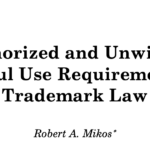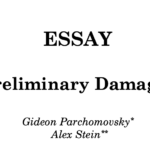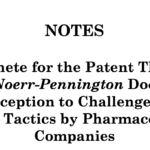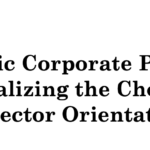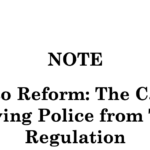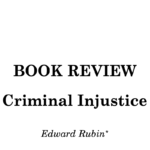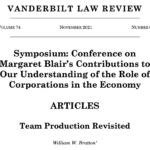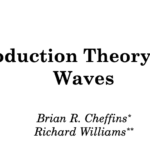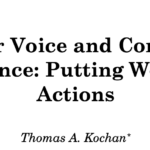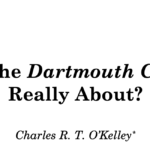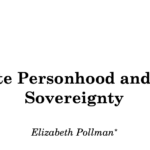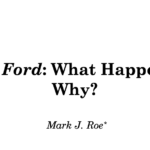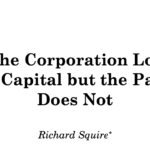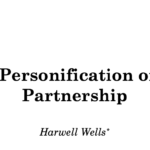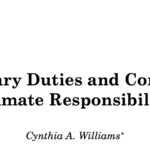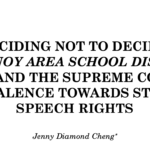Volumes Category
Unauthorized and Unwise
Jan. 24, 2022—Robert A. Mikos | 75 Vand. L. Rev. 161 (2022) | For decades, the United States Patent and Trademark Office (“PTO”) has required trademark owners to comply with sundry nontrademark laws governing the sale of their trademarked goods and services. Pursuant to this “lawful use requirement,” the Agency has refused or even cancelled registration of thousands...
Preliminary Damages
Jan. 24, 2022—Gideon Parchomovsky & Alex Stein | 75 Vand. L. Rev. 239 (2022) | Historically, the law helped impecunious plaintiffs overcome their inherent disadvantage in civil litigation. Unfortunately, this is no longer the case: modern law has largely abandoned the mission of assisting the least well-off. In this Essay, we propose a new remedy that can dramatically...
A Machete for the Patent Thicket
Jan. 24, 2022—Lisa Orucevic | 75 Vand. L. Rev. 277 (2022) | Outrageous drug prices have dominated news coverage of the American healthcare system for years. Yet despite widespread condemnation of skyrocketing drug prices, nothing seems to change. Pharmaceutical companies can raise drug prices with impunity because they hold patents on their drugs, which give them monopolies. These...
Dynamic Corporate Purpose
Jan. 24, 2022—Fields Pierce | 75 Vand. L. Rev. 325 (2022) | The debate over corporate purpose has turned into a “gordian knot” where parties with entrenched beliefs about what the corporation should or should not be within society refuse to waver. There are inherent flaws with the governance models proposed by academics, politicians, and practitioners alike, so...
Road to Reform: The Case for Removing Police from Traffic Regulation
Jan. 11, 2022—Aaron Megar | 75 Vand. L. Rev. En Banc 13 (2022) | This Note advocates for the removal of police from traffic-law enforcement and the creation of unarmed Civilian Traffic Forces (“CTF”) at the municipal and state levels. Since the Supreme Court’s decision in Whren, there has been a significant amount of legal scholarship criticizing...
Criminal Injustice
Jan. 11, 2022—Edward Rubin | 75 Vand. L. Rev. En Banc 1 (2022) | Reviewed: JED S. RAKOFF, WHY THE INNOCENT PLEAD GUILTY AND THE GUILTY GO FREE: AND OTHER PARADOXES OF OUR BROKEN LEGAL SYSTEM, Farrar, Strauss & Giroux 2021. Pp. 208. $27.00 Hardcover. As its title suggests, Why the Innocent Plead Guilty and the Guilty...
Team Production Revisited
Nov. 24, 2021—William W. Bratton | 74 Vand. L. Rev. 1539 (2021) | This Article reconsiders Margaret Blair and Lynn Stout’s team production model of corporate law, offering a favorable evaluation. The model explains both the legal corporate entity and corporate governance institutions in microeconomic terms as the means to the end of encouraging investment, situating corporations within...
Team Production Theory Across the Waves
Nov. 24, 2021—Brian R. Cheffins & Richard Williams | 74 Vand. L. Rev. 1583 (2021) | Team production theory, which Margaret Blair developed in tandem with Lynn Stout, has had a major impact on corporate law scholarship. The team production model, however, has been applied sparingly outside the United States. This article, part of a symposium honoring Margaret...
Worker Voice and Corporate Governance: Putting Words into Actions
Nov. 24, 2021—Thomas A. Kochan | 74 Vand. L. Rev. 1625 (2021) | The encouraging news is that in 2019 the Business Roundtable recanted on its 1997 statement. Its members recognized that prioritizing shareholder value had gone too far; now they again endorsed the principle that a corporation should be held responsible for addressing the interests of not...
What Was the Dartmouth College Case Really About?
Nov. 24, 2021—Charles R. T. O’Kelley | 74 Vand. L. Rev. 1645 (2021) | In 1769, King George III issued a Royal Charter incorporating twelve persons as The Trustees of Dartmouth College with the right of self-perpetuation. The charter also identified one of the trustees, Eleazar Wheelock, as the founder and initial president of the corporation, with the right...
Corporate Personhood and Limited Sovereignty
Nov. 24, 2021—Elizabeth Pollman | 74 Vand. L. Rev. 1727 (2021) | This Article, written for a symposium celebrating the work of Professor Margaret Blair, examines how corporate rights jurisprudence helped to shape the corporate form in the United States during the nineteenth century. It argues that as the corporate form became popular because of the way it...
Dodge v. Ford: What Happened and Why?
Nov. 24, 2021—Mark J. Roe | 74 Vand. L. Rev. 1755 (2021) | Behind Henry Ford’s business decisions that led to the widely taught, famous-in-law-school Dodge v. Ford shareholder primacy decision were three industrial organization structures that put Ford in a difficult business position. First, Ford Motor had a highly profitable monopoly and needed much cash for the...
Why the Corporation Locks in Financial Capital but the Partnership Does Not
Nov. 24, 2021—Richard Squire | 74 Vand. L. Rev. 1787 (2021) | Each partner in an at-will partnership can obtain a cash payout of his interest at any time. The corporation, by contrast, locks in shareholder capital, denying general payout rights to shareholders unless the charter states otherwise. What explains this difference? This Article argues that partner payout...
The Personification of the Partnership
Nov. 24, 2021—Harwell Wells | 74 Vand. L. Rev. 1835 (2021) | What does it mean to say a business association is a legal person? The question has shadowed the law of business organizations for at least two centuries. When we say a business is a legal person we may be claiming that the law distinguishes its assets,...
Fiduciary Duties and Corporate Climate Responsibility
Nov. 24, 2021—Cynthia A. Williams | 74 Vand. L. Rev. 1875 (2021) | In this paper, I take up this question by reference to a public law issue much in focus today, that of climate change. In Part I, I provide an extremely brief overview of the understanding of climate risk as a financial risk, connecting that overview...
Deciding Not to Decide: Mahonoy Area School District v. B.L. and the Supreme Court’s Ambivalence Towards Student Speech Rights
Nov. 3, 2021—Jenny Diamond Cheng | 74 Vand. L. Rev. En Banc 511 (2021) | In June 2021, the Supreme Court issued opinions in its first school speech case in over fourteen years. In Mahanoy Area School District v. B.L., an eight-member majority held that high school officials violated a teenager’s First Amendment rights when they suspended...
